June 10, 2022
Air Date: June 10, 2022
FULL SHOW
SEGMENTS
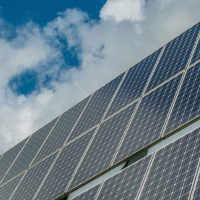
Green Light for Solar Panels
View the page for this story
The US solar industry had been largely frozen since April with the threat of draconian tariffs, and thousands of workers have been laid off, stalling crucial progress towards climate goals. But then on June 6th, President Biden signed an executive order temporarily suspending tariffs on solar panels imported from Southeast Asia and invoked the Defense Production Act to stimulate more domestic production. Utility-scale solar installer SOLV Energy is among those solar companies now back in business, and its CEO George Hershman, speaks with Host Bobby Bascomb about this attempted derailment of clean energy progress needed to face the climate crisis. (08:54)
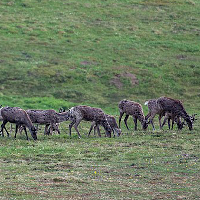
Beyond the Headlines
/ Peter DykstraView the page for this story
Environmental Health News editor Peter Dykstra and Host Bobby Bascomb note three oil companies have abandoned their plans to drill in the Arctic National Wildlife Refuge in Alaska despite rising oil prices. Also, Japan seeks to revolutionize renewable energy with a deep ocean current turbine prototype. And they commemorate the 50th anniversary of the EPA’s ban on the pesticide DDT, ten years after Rachel Carson’s exposé of the dangers of pesticides in her seminal book “Silent Spring.” (04:16)
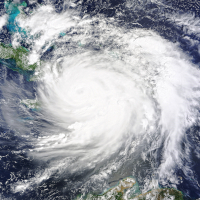
The 'Danger Season'
View the page for this story
With the start of the Atlantic hurricane season June 1, Tropical Storm Alex has already flooded Cuba, the Bahamas, and South Florida. Wildfires are already ravaging parts of the western United States, deadly heat waves are predicted, and some scientists say summer in the United States is the 'danger season'. Kristina Dahl, principal climate scientist with the Union of Concerned Scientists tells Host Bobby Bascomb about the disturbing trend of increasingly dangerous climate-related extreme weather events. (06:58)
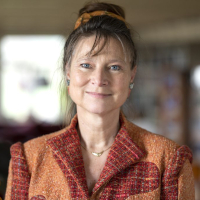
Landmark Decision For Climate Action
View the page for this story
Attorney Marjan Minnesma is the European winner of the 2022 Goldman Environmental Prize, in recognition of the landmark suit she and her team won against the Dutch government over its inadequate steps to curb greenhouse gas emissions. She joins Host Steve Curwood to talk about other cases this precedent has inspired, and how climate activists in the United States can take similar legal action. (09:56)
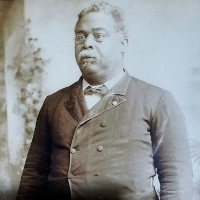
Join us for a Juneteenth Celebration!
Join Living on Earth and our partners for "Black Courage Upon the Sea: A Juneteenth Celebration of Robert Smalls" on Monday, June 20th ()
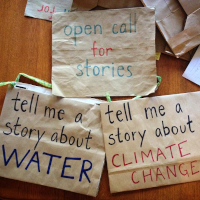
1,001 Voices on Climate Change
View the page for this story
Even as the climate emergency grows it can be difficult to comprehend what a degree of temperature change or a foot of sea level rise really means on a personal scale. So journalist Devi Lockwood set out to find the stories of real people coping with climate disruption by traveling in twenty countries and asking people to “tell me a story about climate change.” She joined Host Steve Curwood to share a taste of these “1,001 Voices on Climate Change.” (15:48)
Show Credits and Funders
Show Transcript
220610 Transcript
HOSTS: Bobby Bascomb, Steve Curwood
GUESTS: Kristina Dahl, George Hershman, Devi Lockwood, Marjan Minnesma.
REPORTERS: Peter Dykstra
[THEME]
CURWOOD: From PRX – this is Living On Earth.
[THEME]
CURWOOD: I’m Steve Curwood.
BASCOMB: And I’m Bobby Bascomb
The threat of steep tariffs on imported solar panels was crippling the US solar industry but it’s now been lifted.
HERSHMAN: It is very, very good news. And we're glad that the administration stepped in and recognize the damage that was happening to the industry, to their agenda for clean energy. And quite frankly, to the climate.
CURWOOD: Also, in a landmark court case, citizens in the Netherlands force their government to act on the climate crisis.
MINNESMA: Our Dutch Government has been forced to do 25% less emissions in 2020. They decided to spend much more money on climate change in the end 45 billion euros, and to close down a coal fired power plant and change the law for the other coal fired power plants.
CURWOOD: That and more this week on Living on Earth – Stick Around!
[NEWSBREAK MUSIC: Boards Of Canada “Zoetrope” from “In A Beautiful Place Out In The Country” (Warp Records 2000)]
[THEME]
Green Light for Solar Panels
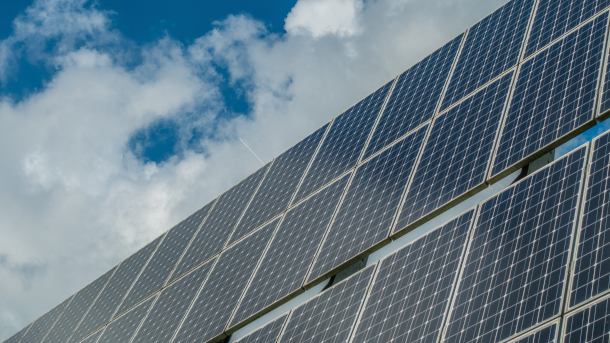
SOLV Energy’s main projects can produce 200 Megawatts of energy, around the equivalent yield of a small coal plant. (Photo: Piqsels, public domain)
CURWOOD: From PRX and the Jennifer and Ted Stanley Studios at the University of Massachusetts Boston, this is Living on Earth. I’m Steve Curwood.
BASCOMB: And I’m Bobby Bascomb.
In April the installation of solar power in the US almost stopped completely when the Commerce Department launched a probe that could have imposed draconian tariffs on solar panels imported from four Asian countries. In the face of outcries from industry and members of Congress on June 6th President Biden made solar panels from those countries duty-free for the next 24 months, but much damage to the US renewable energy industry had already been done. Eighty percent or more of solar panels installed in the US come from Asia, so with possible penalties ranging as high as 250 percent of standard tariffs, solar companies had laid off thousands of workers and postponed or canceled countless installations. The Commerce Department probe is based on claims that China is circumventing tariffs on their solar panels by completing manufacture in Cambodia, Vietnam, Malaysia, and Thailand. Along with temporary tariff exemptions for solar panels from those four countries President Biden has also invoked the Defense Production Act to jump start more domestic production. For a view from inside the solar industry I’m joined now by George Hershman, CEO of SOLV Energy, builders of utility sized solar farms. Welcome back to Living on Earth, George.
HERSHMAN: Well, thank you for having me. Appreciate it.
BASCOMB: So we had talked with you back in the first week of April, and you mentioned then that your company SOLV energy just couldn't get the solar panels that you needed to complete your installations. How have things worked out for you?
HERSHMAN: Well, it's been a challenging last couple of months. We have actually shut down three projects, and probably laid off four to five hundred people across those projects. We also have about six projects that are currently on hold, awaiting a decision. And then we obviously got the decision that is favorable. The President's Executive Order has delayed any impact of tariffs for 24 months. And this action has been pretty clear and decisive, which is what we were looking for. It will be able to start correction almost immediately. And so that is going to allow us to restart some of those projects again.
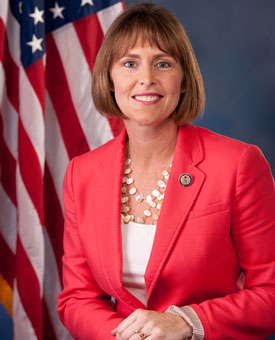
Rep. Kathy Castor (D-FL) is an eighth-term Congresswoman and Chair of the House Select Committee on the Climate Crisis. She and 84 House colleagues signed on to a letter calling on President Biden to ease the solar tariff threats. (Photo: United States Government, Wikimedia Commons, Public Domain)
BASCOMB: Well, that's what any industry needs, right? You need certainty, you need to know what the future is going to look like, what the rules are going to be and how you can proceed.
HERSHMAN: Exactly. And the challenge we've had is that tariffs have been hanging over this industry's head for 12 years. And we keep adjusting to what the rules of engagement are on the way to procure material. And having the certainty that the executive order brings allows us to really focus on not only building projects, but understanding that we want to build a robust manufacturing supply chain in the U.S. as well. And that gives us the time to do it.
BASCOMB: Now from what I understand there was a lot of pushback against these tariffs, both from your industry and from many members of Congress. Can you tell us about that, please?
HERSHMAN: Yes, there was significant pushback. We were able to pull together a letter in support of our position from 85 house members, from 22 senators, from over 20 governors. That was really a win from the industry standpoint. For one of the first times in my career in solar, we have seen that the industry as a whole got around an issue. That was an important part of how we were able to be successful on this.
BASCOMB: What are you hearing from, you know, colleagues about how they might be able to move forward, now that we have this announcement from the White House?
HERSHMAN: What we're hearing is that they're all happy to get back to work. We have probably 20% of the utility market share. So we see a lot of direct impact. But some of the smaller projects, because of the shorter duration of the projects, they were impacted very quickly. Some saw 80 or 90% reduction in the market. So they're hardest hit. But the good news is they can be likely the quickest out of this, because those projects can turn back on and get moving very quickly. I don't want to diminish the impact that was caused by this, you can't stop an industry cold for six months and expect that it just starts up overnight. But it is very, very good news. And we're glad that the administration stepped in and recognized the damage that was happening to the industry, to their agenda for clean energy. And quite frankly, to the climate.
BASCOMB: Can you remind us please of where we've come in the solar industry and where we're going, both in terms of the capacity to provide clean energy and the jobs that come along with solar energy.
HERSHMAN: We started our business back in 2008 when solar was really an emerging market in California. And now as a single company, we've built solar plants in 25 different states. We have built 150 different projects, employ about 4000 people across the country. The solar industry has grown to well over 200,000 people. Now that doesn't even include a lot of the ancillary industries that support this from steel manufacturing to trucking. So there's probably hundreds of thousands of employees that touch this industry. So, much different than it was even only a few years ago.
BASCOMB: I've read that solar actually employs more people in U.S. electricity generation than oil, coal and gas combined. That's probably surprising to a lot of our listeners.
HERSHMAN: Yeah, that's true. It continues to grow and is a industry that touches all sectors of the economy. Everything from residential, solar, commercial solar, and all the way up to utility scale solar.
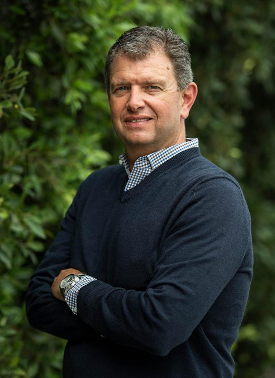
George Hershman is the CEO of SOLV Energy. He reflects how this is the first time in his solar career that he has seen the entire industry rally behind one issue. (Photo: Courtesy of SOLV Energy)
BASCOMB: The White House has also announced that President Biden will invoke the Defense Production Act to expand domestic production of solar panels. And he's directing the federal government to increase the number of U.S. made solar panels that the government buys. What do you see as the potential there?
HERSHMAN: Those are good steps forward. It's not going to bring production to the U.S. itself. Congress needs to pass the provisions of Build Back Better that address clean energy, both the investment tax credit extension, and more importantly, for manufacturing, the manufacturing tax credit. We understand that most of the clean energy provisions included in Build Back Better are largely acceptable to all parties and will likely move forward in any reconciliation bill. We need to ensure that we onshore a significant amount of manufacturing to support the industry.
BASCOMB: Well, with more support from the federal government of this kind, how long do you think it might take for us to really compete with the handful of Asian countries that have dominated the solar market so far?
HERSHMAN: I think that we will have manufacturing in the U.S. 18 months to two years after we see a industrial policy bill like SEMA passed in the U.S. The executive order, good first step. But it's not going to create the manufacturing that we need to compete. And a manufacturing industrial policy bill will absolutely do that. And I think that we will have modules coming out of U.S. factories in eighteen months to two years.
BASCOMB: Well, that would be great. That would certainly set us in the right trajectory to seriously address climate change.
HERSHMAN: Absolutely. And I think that we want to see modules and solar products manufactured in the US. It lowers the carbon footprint because you minimize the shipping of components. You have product here which creates jobs. We just need to be able to do it in a responsible manner. We can't cut off supply without building manufacturing concurrently.
BASCOMB: George Hershman is CEO of SOLV energy. George, thanks so much for your time today.
HERSHMAN: You're welcome. Thank you so much. Appreciate it.
Related links:
- Read President Biden’s Executive Order Here
- George Hershman’s Twitter
- Learn More about SOLV Energy
[MUSIC: The Beatles, “Here Comes The Sun” on Abbey Road (Remastered), Universal Music Group]
Beyond the Headlines
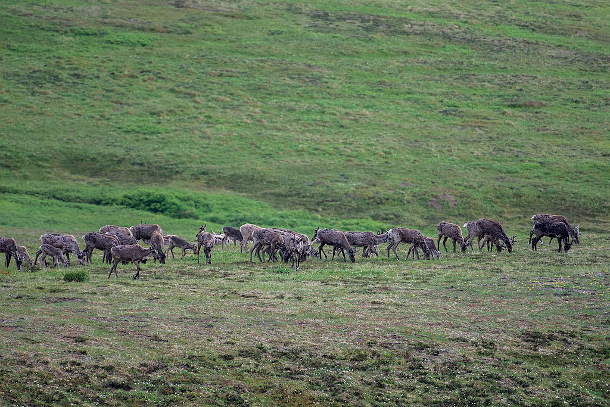
A herd of caribou in Alaska. The Arctic National Wildlife Refuge is a key calving area for the Porcupine Caribou subspecies (Photo: Mary Lewandowski, National Park Service, Public Domain)
BASCOMB: Well, it's time for a trip now beyond the headlines with Peter Dykstra. Peter is an editor with Environmental Health News. That's EHN.org and dailyclimate.org. Hey there, Peter, what do you have for us this week?
DYKSTRA: Hi, Bobby. Here's an item from the strange world of the oil industry. As we see prices going up at the gas pump. We see the per barrel price around the world going up. But we have three firms, that are among the firms that have been pushing to drill in the Arctic National Wildlife Refuge, that have basically decided they want no more of the proposal.
BASCOMB: Hmm. Why are they pulling out now just as oil is more profitable?
DYKSTRA: Well, this was an oil lease scheduled and carried out in the final days of the Trump administration, which has long been opposed by not only conservation groups, but by the Native groups in the area that are concerned about the migration of caribou through ANWR, the Arctic National Wildlife Refuge.
.jpg)
A map of the global deep ocean currents. (Photo: Ingwik, Wikimedia Commons, satellite photo originally from NASA)
BASCOMB: Well, what else do you have for us this week?
DYKSTRA: Here's another item on offshore energy of a different kind. There are tests said to be successful in a very, very strong current off the east coast of Japan. It could be a major source of energy for Japan. Japan is particularly interested in developing alternate sources of energy, they have no domestic oil. And obviously ever since the Fukushima catastrophe more than a decade ago, nuclear power is hardly in fashion there as well.
BASCOMB: I've read that they could actually get as much as 60% of their present generating capacity from energy from currents like these. It’s early on, but it seems quite promising for them.
DYKSTRA: Well, that's it, the potential has been there for a long time. Of course, potential can be a really dirty word in something as volatile as the energy industry. But let's see where it goes. Another source of clean energy could be something that really changes the field.
BASCOMB: Well, what do you have for us from the history books this week?
DYKSTRA: There's a major anniversary and a positive anniversary from 50 years ago, because on June 14, 1972, that brand new Agency, the EPA, the US Environmental Protection Agency, announced a ban on DDT to take effect at the end of 1972. It's a pesticide that had been identified as the cause of the decline of bird species from bald eagles and pelicans down to tiny hummingbirds.
BASCOMB: 1972, I believe that's a full decade after Rachel Carson, you know, alerted the world to the dangers of DDT in her just seminal book, "Silent Spring".
DYKSTRA: A modern day environmental hero, a very courageous woman, who was relentlessly attacked by the chemical industry. Her book is still one of the major works of environmental journalism and it came out before environmental journalism was even a thing.
.jpeg)
Rachel Carson published “Silent Spring” in 1962 to alert the American public to the dangers of pesticides, which prompted the banning of the pesticide DDT in 1972. (Photo: orionpozo, Flickr, CC BY 2.0)
BASCOMB: I mean, it took 10 years for the EPA to act on what she was alerting us to, but better late than never. I mean, we have bald eagles in Central Park right now chances are pretty solid that might not be the case had we not really addressed DDT back then.
DYKSTRA: Right, so many bird species either are in the middle of a comeback, or they've already made the comeback. Other eagle species, peregrine falcons, all the way down to smaller birds, whose eggshells were made thin by DDT. Once DDT was off the market, those species had a chance to recover. A major success story started by Rachel Carson and her work 60 years ago, and the EPA's follow up 50 years ago.
BASCOMB: All right. Well, thanks, Peter. Peter Dykstra is an editor with Environmental Health News. That's EHN.org and dailyclimate.org. We'll talk to you again real soon.
DYKSTRA: All right, Bobby, thanks a lot and we'll talk to you soon.
BASCOMB: And there's more on these stories on the Living on Earth website. That's LOE.org.
Related links:
- The Washington Post | “Once Eager to Drill, Oil Companies Exit Leases in Arctic Refuge”
- Bloomberg | “Giant Deep Ocean Turbine Trial Offers Hope of Endless Green Power”
- History.com: How Rachel Carson Alerted the World About the Dangers of DDT
- Read about DDT on the EPA website
[MUSIC: Oscar Peterson Trio, “Bag’s Groove” on Night Train (Expanded Edition)]
CURWOOD: Coming up – Some scientists say summer in North America is now the “danger season” as climate disruption fuels more destructive wildfires and storms. That’s just ahead on Living on Earth.
ANNOUNCER: Support for Living on Earth comes from Sailors for the Sea and Oceana. Helping boaters race clean, sail green and protect the seas they love. More information @sailorsforthesea.org. Support also comes from Friends of Smeagull the Seagull and Smeagull’s Guide to Wildlife. It’s all about the wildlife right next door to you! That’s Smeagull, S - M - E - A - G - U - L - L, SmeagullGuide.org.
[CUTAWAY MUSIC: Oscar Peterson Trio, “Bag’s Groove” on Night Train (Expanded Edition)]
The 'Danger Season'
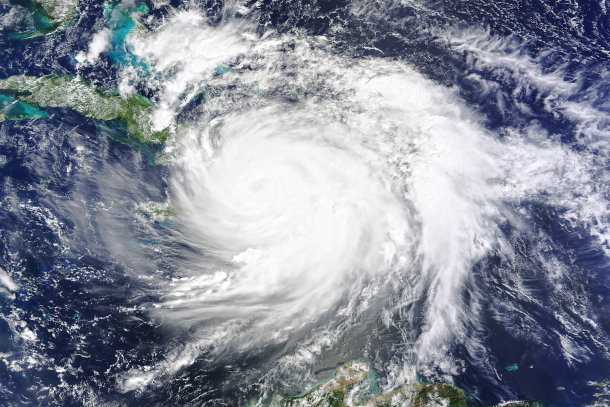
Hurricanes, like 2016’s Hurricane Matthew pictured above, are increasing in severity due to a warming climate. (Photo: Joshua Stevens, NASA, Flickr, CC BY 2.0)
CURWOOD: It’s Living on Earth, I’m Steve Curwood.
BASCOMB: And I’m Bobby Bascomb
June 1st was officially the first day of the Atlantic hurricane season, and already Tropical Storm Alex, has flooded Cuba, the Bahamas, and South Florida. Meanwhile, wildfires are ravaging parts of the western United States, particularly New Mexico. Add in deadly heat waves and some climate scientists are starting to refer to summer in the US as danger season. One of them is Kristina Dahl, she’s a principal climate scientist with the Union of Concerned Scientists.
DAHL: So what we've seen over the last few years in the US and really in parts all around the world, is that summertime is bringing disaster after disaster and threat after threat. So whether we're talking about heat waves that affect one part of the country than the next, and then the next, or whether we're talking about hurricanes that slam into the Gulf Coast and travel thousands of miles and cause flooding in New York City, we're seeing these events that have always happened, be really amplified by climate change in such a way that they're presenting new and different dangers to our population. So we wanted to call attention to that fact this summer. And to let people know that danger season is something that we experience every year. And the more that we can recognize it as such, the more we can start to plan ahead so that we're not pummeled by it year after year.
BASCOMB: Well, let's unpack that a bit. Wildfires are already making news. New Mexico is battling one of the largest wildfires in state history. What is the relationship between climate change and this increase in severity of wildfires that we've been seeing over the last few years?
DAHL: Climate change is playing a very clear role in making wildfires in the US and around the world both more severe and larger. It's not the only factor that's at play. We know that a century of fire suppression in the United States, and the lack of management of our forests have led to a buildup of vegetation that's allowing fires to be more severe and larger as well. But studies indicate that about half of the increased area that's burning in the United States is attributable to climate change directly. What we're seeing in a lot of parts of the Western US is that wildfires are growing bigger than they used to. That's a change that if you just simply look at the average area of the average wildfire a couple decades ago, it was smaller than it is today. And some of that has to do with the fact that we have all this vegetation built up from having suppressed fires in the past, so fires have a lot more fuel that they can burn. What we can anticipate in the future is that these trends toward more severe and larger wildfires will increase if we don't get our heat trapping emissions of things like carbon dioxide from the burning of fossil fuels in check. But the more that we can reduce those emissions, the less we'll see these trends continue.
BASCOMB: So, while some parts of the country will be battling fire this summer, other parts are dreading hurricanes and the flooding that can come along with them. What are you expecting for the 2022 hurricane season?
DAHL: The predictions that we're seeing from the National Oceanic and Atmospheric Administration, or NOAA, suggests that we're going to see an above average level of hurricane activity in the Atlantic Ocean this season. So hurricane season runs from June 1 through November. And over the course of that season, NOAA suggests that we'll see up to 21 storms that get named. So not all of those will be hurricanes, some will be tropical storms. They expect we'll see six to ten hurricanes, and of those, between three and six will reach what we call major hurricane categories. That's categories three, four and five, sort of the strongest categories of hurricanes. So we do anticipate that, like we've seen in the last couple of years, we will be seeing stronger than normal activity for Atlantic hurricanes.
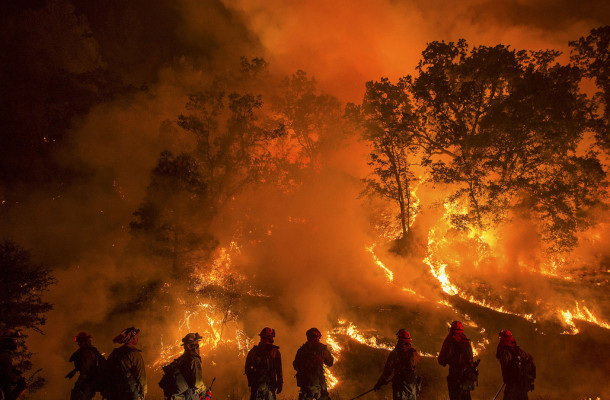
Firefighters battle the Valley Fire in California, 2015. Wildfires in the United States have been increasing in frequency and severity in recent years. (Photo: Jeff Head, Flickr, Public Domain)
BASCOMB: You know, more destructive wildfires and hurricanes. They're associated with rising temperatures and the heat associated with climate change. Can you briefly explain that for us?
DAHL: You're right. Wildfires and hurricanes both respond to rising temperatures by becoming stronger and more intense. When we look at wildfires, warmer temperatures tend to exacerbate or worsen drought conditions or dry conditions. And in the western US, that means that when it's anomalously warm, we end up drying out a lot of the vegetation that's on the ground, and then that vegetation serves as fuel for the wildfires and allows them to burn more severely and larger areas. When we look at the connection between warming temperatures and hurricanes, there are actually a few ways that climate change and warming temperatures are making hurricanes more intense. So for one, when you have a warmer ocean, all of that additional energy associated with a heat in the ocean, serves as fuel for the storm and allows it to grow stronger. We also know that rising temperatures are increasing sea levels around the world. And that means that when you get a storm surge from a hurricane, there is you know, higher water level associated with that storm surge that can then flood a greater area and cause more destruction. And then finally, a warmer atmosphere can hold more moisture. So that means that with hurricanes, they can be carrying a lot more moisture, and release that moisture as rain that then ends up causing flooding.
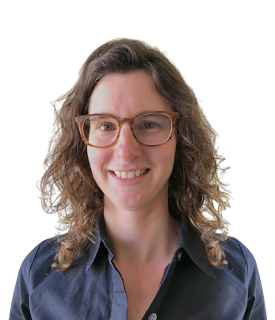
Kristina Dahl is a principal climate scientist with the Union of Concerned Scientists. (Photo: Courtesy of the Union of Concerned Scientists)
BASCOMB: From your perspective, what needs to be done to get us prepared, you know, for this danger season ahead, especially people that are most at risk, you know, communities of color and the elderly and low income households. How can we be smart about this knowing the dangers that lie ahead?
DAHL: So there's a lot that we need to be doing. And we need to be kind of working on it all at the same time. We need to be cutting our greenhouse gas emissions really rapidly and really steeply, because that's going to give us the best chance of limiting the future severity of danger seasons. But at the same time, one thing that we think is really needed is a national resilience strategy, so that every community across the country has access to the sorts of resources that they need to build up their resilience.
BASCOMB: Kristina Dahl is a principal climate scientist with the Union of Concerned Scientists. Kristina, thank you so much for your time with me today.
DAHL: Thanks so much for having me.
Related links:
- The Equation | “We’re Naming Summer “Danger Season” in the US. Here’s Why.”
- National Oceanic and Atmospheric Administration | “NOAA Predicts Above-Normal 2022 Atlantic Hurricane Season”
- The New York Times | “A ‘Perfect Recipe for Extreme Wildfire’: New Mexico’s Record-Breaking, Early Fire Season”
- Union of Concerned Scientists | “Too Hot to Work: Assessing the Threats Climate Change Poses to Outdoor Workers”
- More on Kristina Dahl from the Union of Concerned Scientists
[MUSIC: Red Garland Trio, “Stormy Weather” on All Kinds Of Weather, Fantasy Inc.]
Landmark Decision For Climate Action
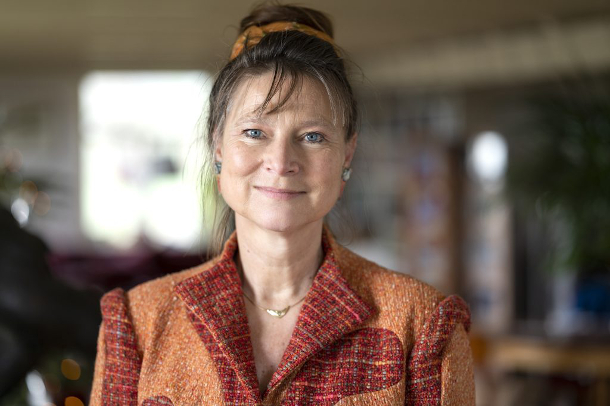
Marjan Minnesma is the founder of Urgenda Foundation, the organization that successfully sued the Dutch Government over its failure to protect its citizens from climate change. (Photo: Courtesy of the Goldman Environmental Prize)
CURWOOD: Each year the Goldman Environmental Prize is awarded to outstanding heroes from each of the inhabited continents. Today we turn to the European winner, attorney Marjan Minnesma. Marjan is from the Netherlands and she and her team successfully argued that the Dutch government must act on its obligation to protect its citizens from the dangers of climate change. That Dutch Supreme Court landmark decision is the first-time citizens have succeeded in suing their own government for failing to meet the challenge of the climate crisis. Marjan Minnesma joins me now for more. Marjan, welcome to Living on Earth!
MINNESMA: Hello, nice to meet you.
CURWOOD: So briefly describe for me the case that you won.
MINNESMA: Yeah, we started already in 2012. And a normally a government should protect its citizens, there's a duty of care to protect your citizens. And if you're not doing enough, this is an unlawful deed. So they should act to protect us. And you can demand this from a judge if your government doesn't act on its own. And that's what we tried. And we won in the Netherlands against the Dutch government, in 2015, the first climate case in the world. And then they appealed and then thereafter went to the Supreme Court. So by the end of 2019, we won finally, after eight years. Our Dutch Government has been forced to do 25% less emissions in 2020. They decided to spend much more money on climate change in the end 45 billion euros, and to close down a coal fired power plant and change the law for the other coal fired power plants.
CURWOOD: Now what types of enforcement mechanisms does this case place on the Dutch government? How will you know that emissions are being cut at the rate that the decision requires?
MINNESMA: Well, for the climate change convention, there is a system in place that every country needs to produce figures every year. So we know every year what the Netherlands has emitted. When we started, we still believed in the rule of law that says that the government will always act and do what the judge says. So we did not upfront ask for anything to enforce it. We have now seen that was not true. So for a next court case, I will put something in place that says if you don't act, then you have to pay fine this and that.
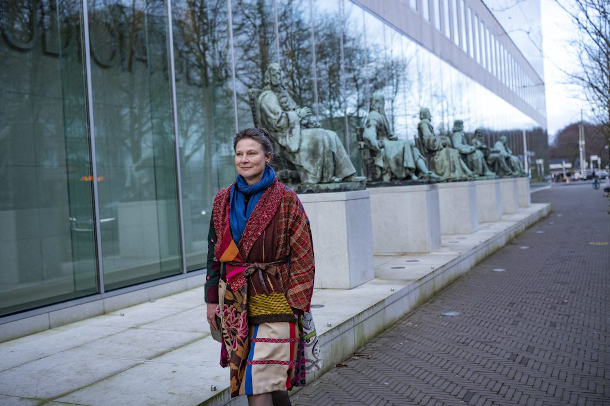
Marjan Minnesma walks outside of the Supreme Court of the Netherlands. (Photo: Courtesy of the Goldman Environmental Prize)
CURWOOD: So you've worked in a variety of fields. Just to name a few that are on your resume: physics, business, international law academia. From your experience, what makes law in particular, an effective means to hold parties accountable in the fight to avoid climate disruption?
MINNESMA: Well, I've been working in the field of sustainability for more than 30 years, and we've tried everything. And in the end, I found out that it's not going fast enough that climate change is going so fast that we will have serious problem this century. And the only way to force government to do what they themselves say that is necessary to do is by bringing them to court and show the facts.
CURWOOD: Why do you think the law was the way that you got it done in the Netherlands?
MINNESMA: In our case, the Dutch government actually agreed that climate change is a big problem with enormous negative consequences and a very big chance to happen. Then the judge said, Okay, if you yourself, say that the lowest level that you really need to do is 25% less emissions in 2020, then you should do that. So courts by looking at the facts, using climate science, and everything that all the countries have underwritten in all those climate change conventions and the Paris Agreement, that's the good thing about the court. It's not political. It's not about PR. It's not about framing. It's about facts.
CURWOOD: The deadlines to keep a relatively stable climate are fast approaching, but the law can oftentimes be slow. Your case took eight years to get to this process. Tell me about the challenges in this regard to using the law to hold climate change aggressors accountable?
MINNESMA: Well, the thing is, we were the very first in the world, but we set up a climate litigation network, and we are now assisting climate cases all over the world. We have translated everything in English. So people would not use the first two years finding things out that we had already found out. And there have been many cases now won up to the highest courts in France and Germany. The young people went to court with the question to the judge, can you please ask our governments to do more? We don't have a life left over if the government doesn't do more. And those two highest judges said, yes, that's true. And that happened within a few years. All those judges look to each other, and learn from each other.
CURWOOD: What advice do you have for people who might want to try to latch on to what you're doing? How could they best get started?
MINNESMA: People that really want to start from scratch, I would say make contact with us. It's called Climate Litigation Network, we have all the arguments from all court cases and find the way that's the best in a certain country, then we could skip a few years and accelerate together.
CURWOOD: From your perspective in the Netherlands. How democratic do the United States's courts systems appear? Are the democratic enough, or do we have too many problems?
MINNESMA: Well, what I see from here is that your judges are much more political than ours. In the Netherlands, the Supreme Court is not selected by politicians. So from a distance, it looks as if our judges are really judging based on facts and science and the law system. But I think everywhere people will see that climate change is a real serious problem for the whole young generation that is already alive and all those thereafter. And that you as a judge might I think I have a role to play. And I think that's what happened here in the Netherlands. And it must have been for those judges in the Netherlands also something challenging to say something with such a big impact, because there were lots of people that were saying this is impossible, they will surely lose in appeal. And in the end, we did win. And I think because of those judges that look simply at the facts, then a judge can force the government to do more to protect the citizens.
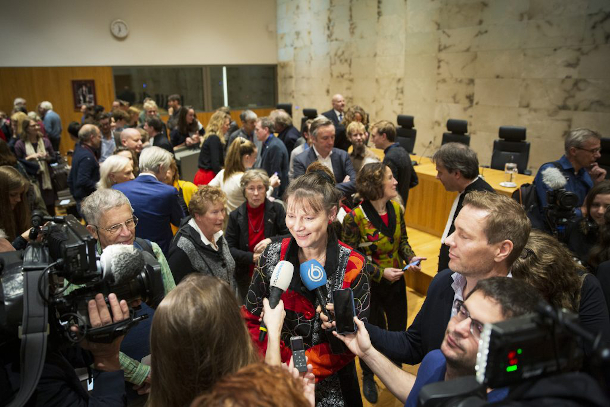
Marjan Minnesma is interviewed in the courtroom. (Photo: Chantal Bekker for Urgenda)
CURWOOD: What can be done in the United States? What kind of legal action should be brought here?
MINNESMA: You already see in your country, the droughts, the enormous fires, and everything is more, earlier, quicker, more often. So it's so obvious that climate change is already hitting us. And in some point of time, you should be able to show that this danger is something that can only be countered by government, and not by individual people by taking a shorter shower. So I would hope that a certain point of time, the judges will also say this is enough, and now the government should act.
CURWOOD: Well, one would think that that time had already arrived.
MINNESMA: Yeah, somehow, as a human race, we are very slow with everything. The same with COVID-19. It has to be in your face. And then you act. We start too late, but I hope still in time to avoid the worst.
CURWOOD: What might you suggest for lawyers in China?
MINNESMA: Well, I think court cases like ours work in democratic societies where you still have independent judges. We are assisting people also in South Korea, and there it is possible. So it depends on the country, whether they have still an independent judiciary and a balance of power that's still in place. And then you can try this.
CURWOOD: What kind of personal pushback have you endured? You know, the fossil fuel industry has had a long campaign to keep the burning of fossil fuels going, and they've pushed back mightily in many places.
MINNESMA: Well of course, they have been giving all kinds of information to our government that was not correct. And they tried to postpone things as much as possible. After we won another court case started by Friends of the Earth against Shell. And all those cases put more pressure both on companies and on governments. And I think in the end, they will have to turn around. Over the years, more and more people really read what we did, and have seen that what we asked was something that our government had put a signature under. So I must say that the turmoil became less.
CURWOOD: Tell me what about some upcoming cases that you're really excited about that you think might have major impacts?
MINNESMA: I think the Australian case if the people win that will have a major effect, because Australia is one of the biggest emitters and a very big country on coal. But I'm also very happy about the court cases in France and Germany, where those young people started the court case for 2030. And based on human rights they won. A lot of people still think that we can go on until 2050. Well, then we surely hit more than two degrees.
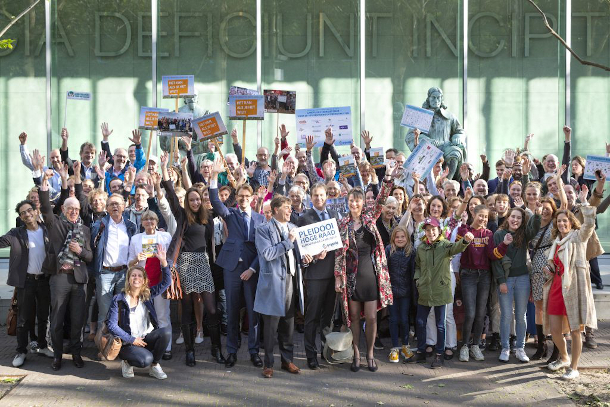
The successful Urgenda case decision has inspired a string of other activists and lawyers in other countries to sue their governments over climate-change transgressions. Cases in Australia, France, and Germany are well underway. (Photo: Courtesy of the Goldman Environmental Prize)
CURWOOD: What gives you hope?
MINNESMA: Well what gives me hope is that more and more people start to take activities, and they win court cases, but they also go to the streets. I've been also working in renewables for 20 years, and people would say, well, this will be going very slow. But actually the growth of renewable energy is enormous, exponential. So it's a race in time. All the techniques are already there. It's more a matter of wanting and seeing that is really necessary than anything else.
CURWOOD: What's the impact of winning the Goldman prize for you and your work?
MINNESMA: Oh, it's an enormous recognition that people all over the world see that court cases are a very important strategy for fighting against climate change. For my whole team, of course, it's very nice to know that there's so much people watching us because we don't really see that. We are working very hard and making long hours. This type of recognition is just very special. It gives people hope, that all over the world, people are watching and learning from each other and together, we might still do what we need to do in time.
CURWOOD: Marjan Minnesma is the founder of Urgenda and this year's winner of the Goldman prize for Europe. Thank you so much for taking the time with us today.
MINNESMA: Bye bye.
Related links:
- The Dutch Urgenda Foundation, founded by Minnesma
- The Goldman Prize’s bio for Minnesma
- Brief of the Urgenda Foundation v. State of the Netherlands case
- Listen to another LOE interview with this year's Goldman winners
[MUSIC: Traditional, Arr. Jan Rap, “Old Waltz” on Original Music from the Netherlands, Rosenklang]
Join us for a Juneteenth Celebration!
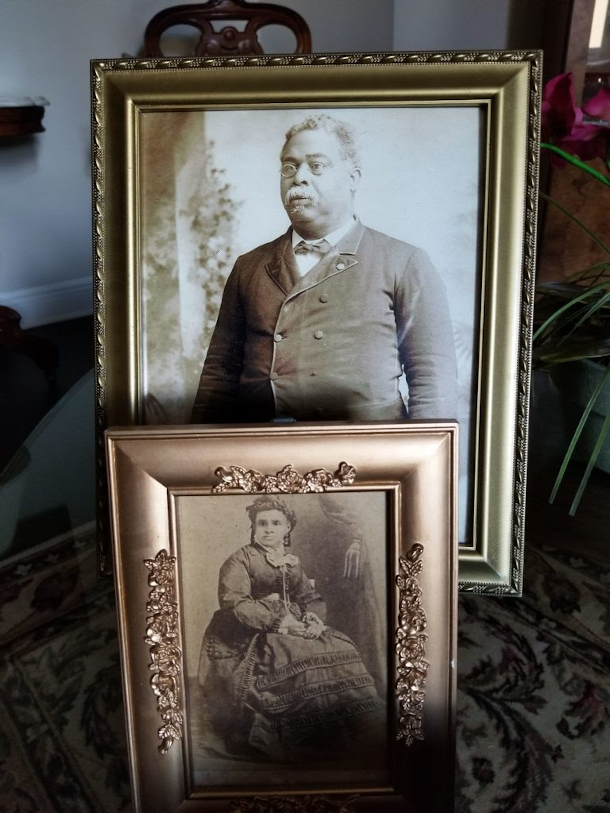
Robert and Hannah Smalls. Photo courtesy of Michael Boulware Moore
CURWOOD: Join Living on Earth and our partners for a special Juneteenth celebration on Monday, June 20th at 6:30 p.m. Eastern. We’ll hear the incredible story of Robert Smalls, an intrepid Black man who took command of a Confederate ship called The Planter in Charleston, South Carolina and liberated himself and his family from enslavement 160 years ago on May 13, 1862. After the Civil War he continued public service in a variety of roles, including five terms as a US Congressman. Our distinguished guests will include Robert Smalls’ great-great-grandson Michael Boulware Moore and retired Admiral Cecil Haney. Admiral Haney is one of only three Black four-star admirals in US Navy history and he will help us navigate through the climate emergency and how it sheds light on national security. So don’t miss our free, live streamed Juneteenth celebration of “Black Courage Upon the Sea”. Sign up at loe dot org slash events.
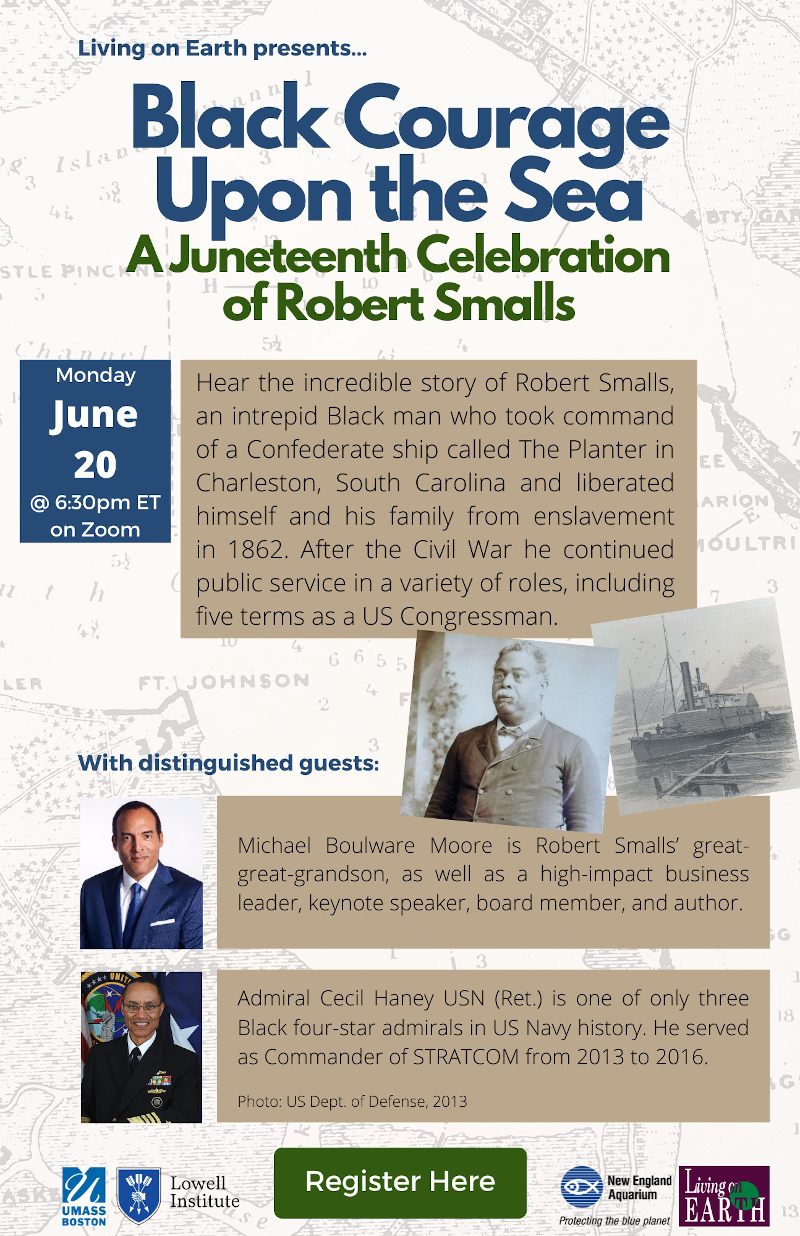
Related link:
Sign up here at loe.org/events
BASCOMB: Coming up – 1001 stories from the frontlines of climate change. That’s just ahead on Living on Earth.
ANNOUNCER: Funding for Living on Earth comes from you, our listeners, and United Technologies, combining passion for science with engineering to create solutions designed for sustainability in aerospace, building industries, and food refrigeration.
[CUTAWAY MUSIC: Matt Wilde, “Remote Planet”, Single, Root Records]
1,001 Voices on Climate Change
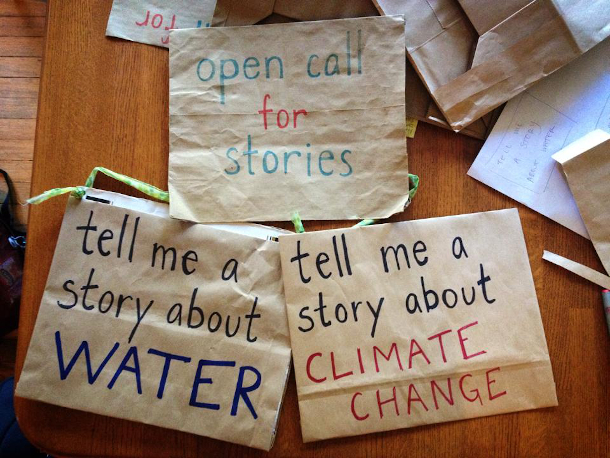
Devi Lockwood’s original “open call for stories” sign, and the two signs she traveled the world with that read “tell me a story about water” and “tell me a story about climate change”. (Photo: Courtesy of Devi Lockwood)
BASCOMB: It’s Living on Earth, I’m Bobby Bascomb
CURWOOD: And I’m Steve Curwood
The climate emergency is here and now yet it can be difficult to comprehend what a degree of temperature change or a foot of sea level rise means. But the stories of real people coping with the changing climate can help us better understand and even draw inspiration from this crisis we now all face. Journalist and writer Devi Lockwood set out to tell these stories in her book 1,001 Voices on Climate Change. She spent five years traveling through 20 countries around the world with a sign asking people to tell their stories. During a Living on Earth Book Club live event I invited Devi to share some of those stories and the inspiration for her book. Welcome to Living on Earth!
LOCKWOOD: Thank you so much for having me, complete honor to be here.
CURWOOD: So what got you, you know, getting up and going out to seek 1,001 stories about climate disruption?
LOCKWOOD: Yeah. So in a weird way, some of it started with the Boston Marathon bombing. I was living in the city at the time, as a student, and we were on lockdown for a couple of days. The first thing that I wanted to do when it became possible to go back outside again was to just have conversations, face to face with strangers. And so I had this kind of fit of inspiration. I found a box that had been used to ship broccoli in bulk to the cooperative house where I was living. And I cut that open and covered it with a paper bag and took out a Sharpie, and wrote "open call for stories" on that sign, and then threaded a little polka dot ribbon around the edge of it so that I could hang it around my neck and have this cardboard as a conversation starter with strangers. And I just spent one afternoon wandering around the city for the day, and heard all sorts of stories. And it just felt really incredible, this kind of spontaneous connection with strangers and, and once I started doing that, I didn't really want to stop. And I had planned for myself a bike trip down the Mississippi River that summer, spent a month traveling about 800 miles starting in Memphis, Tennessee and ending in Venice, Louisiana, where the river meets the Gulf of Mexico. And I brought my little cardboard sign. And when I wasn't on the bike, I wore that sign around my neck, and all sorts of people talked to me about all sorts of things. But one common theme that emerged from a lot of those stories was about water and about climate change, in terms of intensifying storms, saltwater encroachment on the land. People, even south of New Orleans, making decisions to leave communities that they had called home for, in some cases, generations in the aftermath of a big storm. And I thought it might be really powerful to put those stories from the Lower Mississippi River delta in dialogue with stories from other parts of the world.
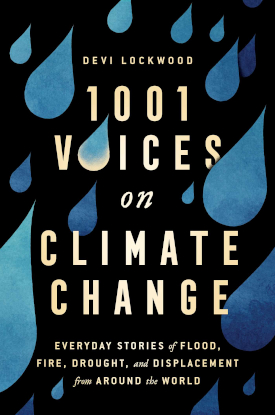
Devi Lockwood’s 2021 book “1,001 Voices on Climate Change: Everyday Stories of Flood, Fire, Drought, and Displacement from Around the World”. (Photo: Courtesy of Tiller Press and Simon & Schuster)
CURWOOD: And when you asked people to speak to you, you actually had two signs: you had "tell me a story about climate" and also "tell me a story about water." Why those two?
LOCKWOOD: Yeah. So when I was on that bike trip down the Mississippi River, it became apparent to me that we don't always have the words to talk about these impacts, but that by using stories, it can be a way in. But also, you know, I think the language we use to talk about climate change a lot of times is really abstract and sometimes inaccessible. It can be hard to feel what a degree of temperature change is, or a foot of sea level change. And so my hope was that putting stories to that would just make it easier to understand. And water -- water is even easier to talk about, right? Everyone has a water story. Water is threaded throughout our lives. And many, not all, but many of the impacts of climate change are things that people experience through water, whether that's an overabundance of it in a flood, an acute lack of it in a drought, sea level rise. And so I wanted to give an inroad to being able to discuss these two issues in tandem.
CURWOOD: Gotta ask you about that title. Of course, I guess this is an allusion to Scheherazade, and most people probably know that story, but just remind us a little bit about it.
LOCKWOOD: Yeah, sure. So this is a story that is very old. [LAUGHS] And that was originally told orally, got written down, passed down over time, and there's been kind of small tweaks. But the version that I know, goes a little something like this. So there was a King named Sharyar, and his wife cheated on him. And he, in a fit of rage, chopped off her head and decided that that wasn't enough, that he would have a vendetta against all women in the kingdom. So he would wed and bed them one by one, and then chop off their head in the morning. And so it finally became Shahrazad's turn to have to go through this. And she is a trickster, so she decides that she is going to tell the king a story. And that story ends with a cliffhanger at dawn. And so he gets to dawn and he really doesn't want to kill her because he wants to know how the story ends. And then she does this night after night after night after night, for 1,001 Nights, at which point it's been three years, they have maybe a kid or two and he decides that he's not going to kill all the women anymore. And what I found particularly moving about that series of interlocking tales, is that Shahrazad tells these stories not only to save her own life, but to change the culture in her kingdom. And I thought it might be fun -- you know, it started out as a joke, I told my friend, I was like, what if I did 1,001 of these interviews? There were kind of more twists and turns to the journey than I could have imagined.

Devi wearing her sign in Bluff, New Zealand. (Photo: Courtesy of Devi Lockwood)
CURWOOD: Yeah, for example? -- well, well take me on a tour of where you went and some of those twists and turns.
LOCKWOOD: Well, I started out in the South Pacific. Part of the inspiration to go there was from an article I had read about the idea of climate refugees going from Tuvalu to other countries, primarily Fiji and New Zealand. And when I spoke with Tuvaluans, they don't like to be called climate refugees, like climate migration is a better kind of term for the people as they'd like to define themselves. But Tuvalu is this low-lying coral atoll nation, about 585 miles south of the equator. And the kind of low-lying nature of this island nation makes it extremely vulnerable to sea level rise, and changes in rainfall patterns and other impacts of climate change. And these are most intimately experienced through both food and water insecurity. So there used to be a freshwater lens under the island. And in the early 2000s, that became salty from changes in the level of the tides. And the seas have been rising at about four millimeters per year since they started monitoring it a couple of decades ago. And that doesn't sound like a lot, but again, really dramatic impacts. When I was there, I asked one of the girls in the host family that I was staying with if she could take me out to see the wells that they used to have to drink water. And she's like, why would you want to see that? It's, there's nothing there. But we went and it's kind of been repurposed as a trash heap. And each family has a big rainwater tank that's attached to the roof. And when it rains, every drop is precious, right? So people are really good at conserving water and making do what they have. But then in times of drought, that scarcity means that they have to make really difficult decisions about, about allocating it.
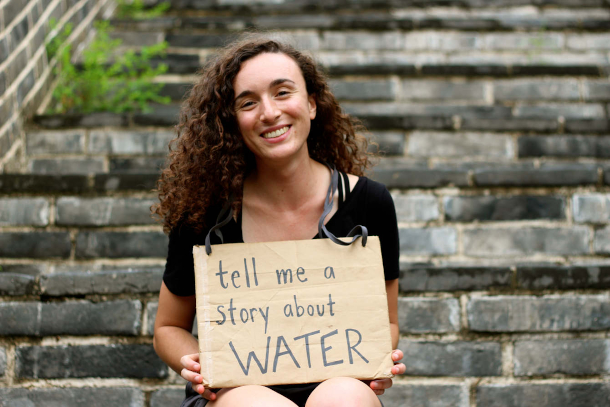
Devi wearing her sign on the Great Wall of China. (Photo: Courtesy of Devi Lockwood)
CURWOOD: As you look back, Devi, at your travels, what are the threads that you pull from these stories to make the fabric of how you would distill this experience? What's common? What's common, and then kind of what starts to differentiate people dealing with this story of climate -- climate change, you say climate disruption, is really what we have, I think.
LOCKWOOD: Yeah, I mean, the thing about climate change is it's a global problem with very hyper local impacts, right? And so I met people who were mourning the loss of five of their best friends from a wildfire in Australia, right, or a man in Thailand who made the choice to move from the rural North to Bangkok, because changes in rainfall patterns had made the rice farming practice of his ancestors just not possible to rely on anymore for a livelihood. And the way that I have come to think about these themes over time. I mean, there's, there's a couple of threads, right? One of them is that climate change drives food and water insecurity. And that that forces people into really difficult scenarios. Another one is that climate change is an environmental justice issue. So the people who are first and worst impacted by these changes are more often than not already experiencing different forms of systemic and structural oppression that make it even more difficult for them to respond to those problems. And also, they're not the ones who have emitted the most greenhouse gases into the atmosphere to begin with, right, so they're the least responsible for it. And another thread -- this is maybe a bit kind of the thread above the threads. But what I was trying to do in this book was to diversify the idea of expertise. Because it's really important to me that we acknowledge at this point, that people are experts in their own lived experience. And that that form of expertise is as valid as what we might conventionally think about as a climate science expert, who's you know, either has a PhD in atmospheric sciences, or has spent time studying ice cores in Antarctica, right, or, or monitoring permafrost melting in Sweden. All of these things are massively important. And there are some of those interviews in the book. But when we consider that science and that form of expertise side by side with the voices of people who are living with the impacts of climate change right now, I think it just becomes harder to ignore the problem, right? Humans are storytelling creatures. And storytelling is it's one of the most ancient technologies that we have. And I have to believe that we can leverage that as a climate solution as well.
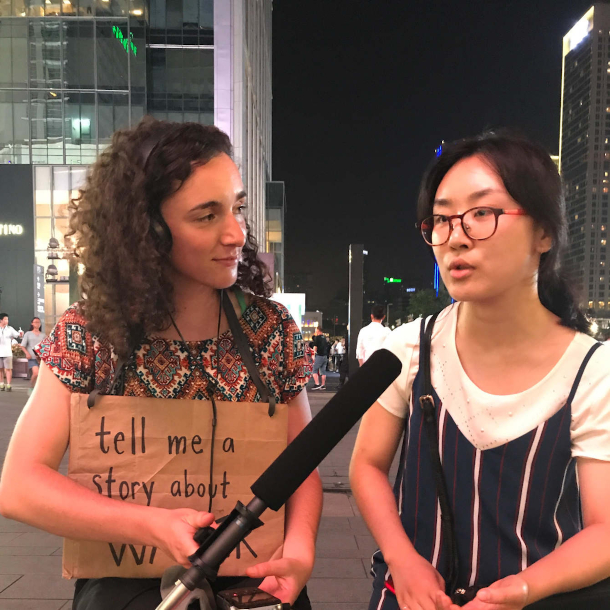
Devi conducts an interview wearing her sign in Chengdu, China. (Photo: Va Sha, Courtesy of Devi Lockwood)
CURWOOD: One of your stories, you go right into the heart of the climate bureaucracy debate, the talks there in Marrakech in 2016. Tell me about that. Tell me about who you met.
LOCKWOOD: One of the really incredible people who I met while I was there is Gertrude Kenyangi, and she is a Ugandan forestry activist. And she comes from a community in southwestern Uganda where small scale agriculture is the kind of main economic activity. But she was at the Conference of the Parties to advocate for gender equality in climate policies, and solutions, because she told me that the people who are the most impacted by climate change are those who are not able to adapt, and they can't absorb the shock. And so it's just almost impossible for people to bounce back from any climate disaster. And she added that women in particular are very vulnerable. And so in Uganda, climate change is impacting agriculture. And she's seeing this, whether it's prolonged droughts, or violent rains, or landslides, even, that can be deadly. And yeah, she's continued when possible to travel to COP to just advocate for how important considering women and considering women in agriculture in Uganda is in these types of negotiations.
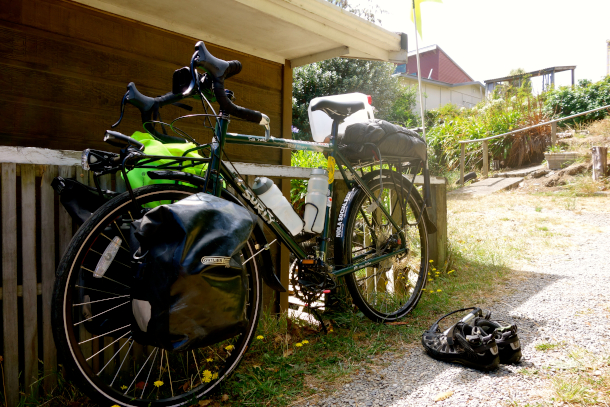
To avoid carbon-intensive air travel as much as possible while traveling the world, Devi rode many miles on her bike and even hitched rides on cargo ships and sailboats. (Photo: Courtesy of Devi Lockwood)
CURWOOD: Well, this part of your set of stories has a wonderful set of lines. I, I wonder if you wouldn't mind turning to page 207, I think it is.
LOCKWOOD: Okay. Sure.
CURWOOD: And read the last two paragraphs of Gertrude's story.
LOCKWOOD: Yeah, sure. "When you think about Uganda, specifically, what does climate change there smell like or sound like or taste like?" I asked. "It tastes like a shortage of food. It tastes like shortage of water, because our agriculture is rain fed. And we are dependent on natural sources of water," she told me. "So when the aquifers dry up and our crops fail, it smells like disaster. It's so evident that climate change is taking place. The seasons have shifted. When we expect rain, it doesn't come. And when it comes, it's too short a duration. You cannot plant anything. So we don't have any fallback position. We don't have reserves of food. We don't have money stashed in the bank. We live day by day."
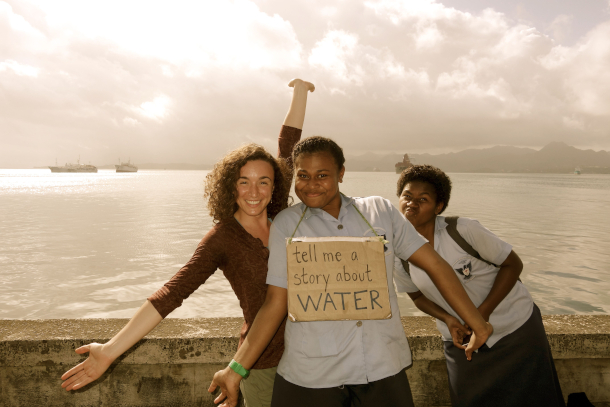
Devi with two local women and her sign in Fiji, which is facing the threat of sea level rise due to climate change. (Photo: Courtesy of Devi Lockwood)
CURWOOD: So what prompted you to start asking this question of what does climate change smell and taste like to people? When did that emerge in the process, that you would get some pretty powerful answers if you asked people that way?
LOCKWOOD: Yeah, you know, I think I was just trying to get sensory. I was thinking about what makes a good story and the elements of good storytelling. And sometimes, especially in these like UN negotiating spaces, we can speak at a really high level about, you know, overly intellectualizing it just because that's the ocean, the water that we're swimming in, the language that we're surrounded by, right? But in fact, breaking it down to, to senses, and to things that we can taste and smell, and, and feel, makes it feel all the more immediate. And yeah, it felt like an important question to ask in that moment. And in a couple of other moments as well.
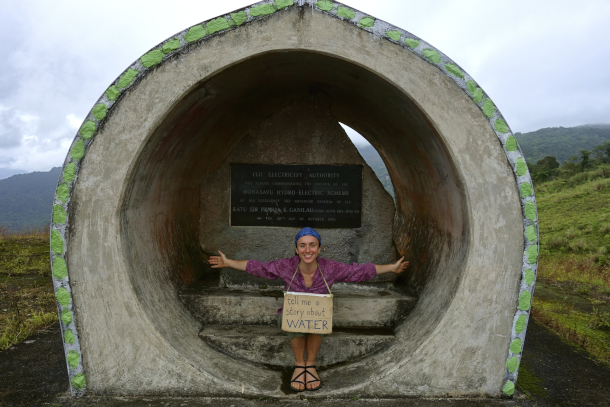
Devi wearing her sign in Fiji. (Photo: Courtesy of Devi Lockwood)
CURWOOD: In many cases, this must have been cathartic for people, right, to actually tell you something, maybe even come to realizations themselves as to how the climate emergency was proceeding in their lives. We have a few more moments can you, can maybe this -- what comes to mind to me among your, your narratives is a woman who was brought up in Florida who talked to you.
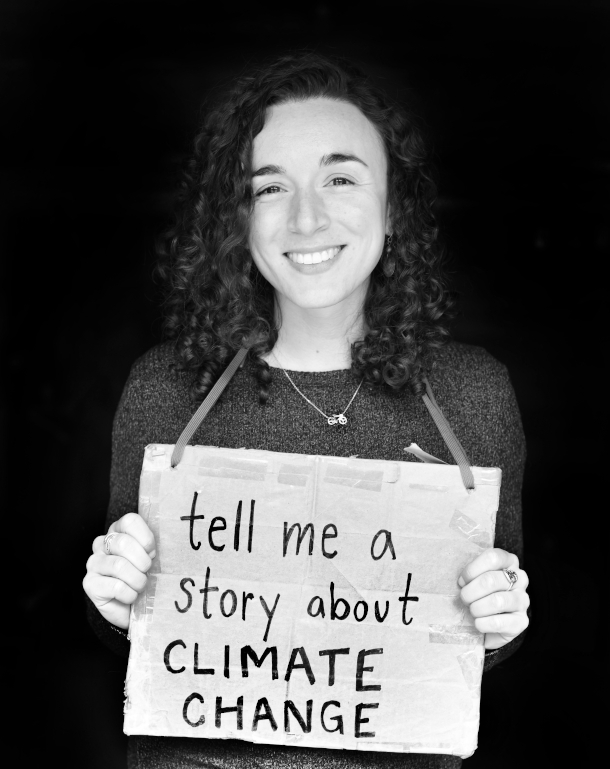
Devi Lockwood with her cardboard sign that reads “tell me a story about climate change”. (Photo: Courtesy of Tiller Press and Simon & Schuster)
LOCKWOOD: Yeah, yeah, we, we met at a climate march in DC. And she told me about diving in the coral reefs in the, in the Florida Keys when she was a kid and just being wowed by the colors and the vibrancy of life there. And she hadn't been there for a couple decades and then returned as an adult. And the majority of that coral was bleached and dead. And she just started sobbing, right? It was so clear how much of a sense of loss she felt. But there's a word for that kind of, experiencing that deep kind of loss and it's solastalgia, right. And so I think that there's ways that we have to cope with, just like you mentioned, the emotional aspect of these changes, right? It's, they're easy to ignore, but I think it's, like many things, just so much better when we talk about it.
CURWOOD: Devi Lockwood is author of the book "1,001 Voices on Climate Change." Devi, again, thank you so much.
LOCKWOOD: Thank you, it's really a joy to be in conversation with you all tonight, thank you so much.
Related links:
- Devi Lockwood’s website
- Watch the full Living on Earth Book Club interview with Devi
- Find the book “1,001 Voices on Climate Change” here (Affiliate link helps donate to LOE and local indie bookstores)
[MUSIC: Andrew Gialanella, “Boundless”, Single]
CURWOOD: Living on Earth is produced by the World Media Foundation.
Our crew includes Naomi Arenberg, Paloma Beltran, Chloe Chen, Iris Chen, Josh Croom, Jenni Doering, Delaney Dryfoos, Mark Kausch, Mark Seth Lender, Don Lyman, Louis Mallison, Aynsley O’Neill, Sophia Pandelidis, Jake Rego, Teresa Shi, and Jolanda Omari.
BASCOMB: Tom Tiger engineered our show. Alison Lirish Dean composed our themes. You can hear us anytime at L-O-E dot org, Apple Podcasts and Google Podcasts, and like us, please, on our Facebook page - Living on Earth. We tweet from @livingonearth. And find us on Instagram at livingonearthradio. I’m Bobby Bascomb.
CURWOOD: And I’m Steve Curwood. Thanks for listening!
ANNOUNCER: Funding for Living on Earth comes from you, our listeners, and from the University of Massachusetts, Boston, in association with its School for the Environment, developing the next generation of environmental leaders. And from the Grantham Foundation for the protection of the environment, supporting strategic communications and collaboration in solving the world’s most pressing environmental problems.
ANNOUNCER 2: PRX.
Living on Earth wants to hear from you!
Living on Earth
62 Calef Highway, Suite 212
Lee, NH 03861
Telephone: 617-287-4121
E-mail: comments@loe.org
Newsletter [Click here]
Donate to Living on Earth!
Living on Earth is an independent media program and relies entirely on contributions from listeners and institutions supporting public service. Please donate now to preserve an independent environmental voice.
NewsletterLiving on Earth offers a weekly delivery of the show's rundown to your mailbox. Sign up for our newsletter today!
 Sailors For The Sea: Be the change you want to sea.
Sailors For The Sea: Be the change you want to sea.
 The Grantham Foundation for the Protection of the Environment: Committed to protecting and improving the health of the global environment.
The Grantham Foundation for the Protection of the Environment: Committed to protecting and improving the health of the global environment.
 Contribute to Living on Earth and receive, as our gift to you, an archival print of one of Mark Seth Lender's extraordinary wildlife photographs. Follow the link to see Mark's current collection of photographs.
Contribute to Living on Earth and receive, as our gift to you, an archival print of one of Mark Seth Lender's extraordinary wildlife photographs. Follow the link to see Mark's current collection of photographs.
 Buy a signed copy of Mark Seth Lender's book Smeagull the Seagull & support Living on Earth
Buy a signed copy of Mark Seth Lender's book Smeagull the Seagull & support Living on Earth

